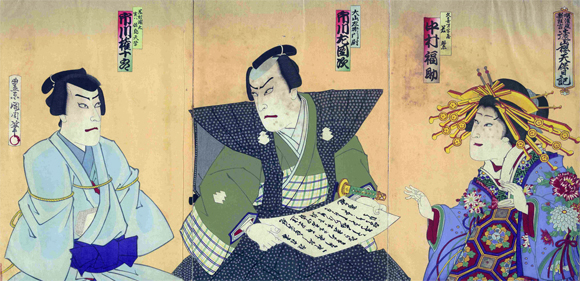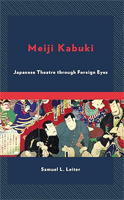| TďYAMA ZAKURA |
| Play title | T˘yama Zakura Tenp˘ Nikki |
|||
| Common title | T˘yama Zakura |
|||
| Authors | Takeshiba Kisui, Kawatake Shinshichi III [1] | |||
| History |
Takeshiba Kisui's drama "T˘yama Zakura Tenp˘ Nikki" was premiered in November 1893 at the Meijiza [casting]. |
|||
| Structure |
The original drama was in 5 acts (12 scenes). |
|||
| Key words |
Anma Fud˘ My˘˘ Gakuya Gomakiyama Hanakawado Kawarasakiza Kita Machi Bugy˘ Machi Bugy˘ Muk˘jima Sewamono Shirasu Sumidagawa Tenp˘ T˘yama Kagemoto T˘yama Kinshir˘ T˘yama Seidan T˘yama-seidanmono Tsutsumi |
|||
| Summary |
Kosabur˘, merchant son of the Obanaya, is in love with the music teacher Kiyomoto Nobuwaka, and the pair plan to drown in the Sumida River. Arriving at the same place on his way to the pleasure quarters is the priest Sajima Tengaku of the J˘nen Temple, who is mistaken by the police for Ikuta Kakudayű and arrested. Kosabur˘, unable to kill himself, becomes the thief Yűten Koz˘ Kokichi. Tengaku and Kakudayű, finding themselves in jail together, break out, meet up with Yűten Koz˘, and all three swear blood brotherhood at Mount Gomaki in Narita. Three years later, Kakudayű is practicing thievery in the guise of the blind masseur Den'an. Reproved by his former wife, Omoto, he kills her. Kakudayű-Den'an is captured after breaking into the Obanaya home and brought to trial, the presiding judge being the sympathetic Fujimura Urata. The evidence is indisputable so Kakudayű-Den'an cannot play the innocent. But Fujimura announces his mistaken belief that Kakudayű-Den'an is the fugitive Tengaku. This unexpected pronouncement creates such turmoil that Kakudayű-Den'an is able to escape. T˘yama Kinshir˘, a playboy who frequents Kabuki dressing rooms and has gained the disapproval of his parents and siblings, has become a magistrate and is now looking into the circumstances of Fujimura's trial of Kakudayű-Den'an. It is revealed that Fujimura, who completely acknowledges his crime, was sympathetic toward the accused because he believed that the man he thought to be Tengaku was falsely charged and imprisoned for crimes he did not commit One of the witnesses is Nobuwaka, who, failing in her suicide bid, has been sold into prostitution and became Kukimanjiya Wakamurasaki. She is actually Kakudayű's daughter, Owaka. Her former lover, Yűten Koz˘, also gives himself up. Tengaku's crime of jail breaking is pardoned. Presently, news arrives that Kakudayű-Den'an, has been caught and everything is settled.
|
|||
| Comments |
"The play is considered interesting because of its antiestablishment views regarding the penal and judicial system. It is thus reflective of a new age in Japanese history." (Samuel Leiter in "New Kabuki Encyclopedia") |
|||
| Trivia |
"T˘yama Zakura Tenp˘ Nikki" was part of a special program celebrating the opening in November 1893 of the Meijiza [more details]. The Meiji star Ichikawa Danjűr˘ IX, who did not play any major role in this drama, appeared on stage in one scene as the deity Fud˘ My˘˘. This scene fell into oblivion. |
|||
| Notes |
[1] The others sakusha were Takeshiba Hy˘z˘ II, Takeshiba Hikosaku, Takeshiba Kanematsu [2], Takeshiba Denz˘, Matsushima Sh˘saku, Takeshiba Masatar˘ [2], Takeshiba Fusaz˘ [2] & Takeshiba Tamez˘ [2]. |
 |
|
Ichikawa Gonjűr˘ (left), Ichikawa Sadanji I (center) and Nakamura Fukusuke IV (right) playing the roles of Sajima Tengaku, T˘yama Kinshir˘ and Kukimanjiya Wakamurasaki in the drama "T˘yama Zakura Tenp˘ Nikki", which was staged in November 1893 at the Meijiza (print made by Utagawa Toyokuni III) |
|
|
| Contact | Main | Top | Updates | Actors | Plays | Playwrights | Programs | Links | FAQ | Glossary | Chronology | Illustrations | Prints | Characters | Derivatives | Theaters | Coming soon | News |


